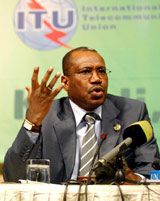UN telecommunication official warns of widening Internet broadband divide
22-05-2008 (New York)

Hamadoun Touré,
ITU Secretary-General
© ITU / M. Zouhri
With more than half of the world’s population now becoming mobile telephone subscribers the digital divide in such phones has been largely bridged, but there remains a widening risk of an Internet broadband divide, the head of the United Nations agency for telecommunication warned.
Speaking at the Global Forum on Access and Connectivity, which was meeting on 19 and 20 May in Kuala Lumpur, International Telecommunication Union (ITU) Secretary-General Hamadoun Touré said a “complicity” between the private sector and the government was essential to increase the availability of information and communication technologies (ICT).
The private sector needed to believe in the governments’ intention, he said, and governments needed to set up fair rules. The other essential element was the presence of strong ICT capacity-building programmes.
The Global Forum, organized by the UN Global Alliance for ICT and Development (GAID), brought together participants from different sectors to seek ways to expand affordable connectivity, application and services in the Asia-Pacific region.
Opening the Forum, UN Under-Secretary-General for Economic and Social Affairs Sha Zukang noted the “phenomenal growth” in wireless communications in Asia. Although the growth had been slower in small-island developing States, many had managed to increase the penetration of mobile telephony to between 10 to 20 per cent of their populations, he said. Such growth was the result of policies that favoured infrastructure deployment and competition in the telecommunications market, he said.
With very limited funds at their disposal, Mr Sha said, small-island developing countries were using mechanisms such as universal service funds and an audiovisual tax to subsidise the deployment of infrastructure in rural and remote areas.
The private sector needed to believe in the governments’ intention, he said, and governments needed to set up fair rules. The other essential element was the presence of strong ICT capacity-building programmes.
The Global Forum, organized by the UN Global Alliance for ICT and Development (GAID), brought together participants from different sectors to seek ways to expand affordable connectivity, application and services in the Asia-Pacific region.
Opening the Forum, UN Under-Secretary-General for Economic and Social Affairs Sha Zukang noted the “phenomenal growth” in wireless communications in Asia. Although the growth had been slower in small-island developing States, many had managed to increase the penetration of mobile telephony to between 10 to 20 per cent of their populations, he said. Such growth was the result of policies that favoured infrastructure deployment and competition in the telecommunications market, he said.
With very limited funds at their disposal, Mr Sha said, small-island developing countries were using mechanisms such as universal service funds and an audiovisual tax to subsidise the deployment of infrastructure in rural and remote areas.
Related themes/countries
· Asia and the Pacific
· Malaysia
Share this story:














